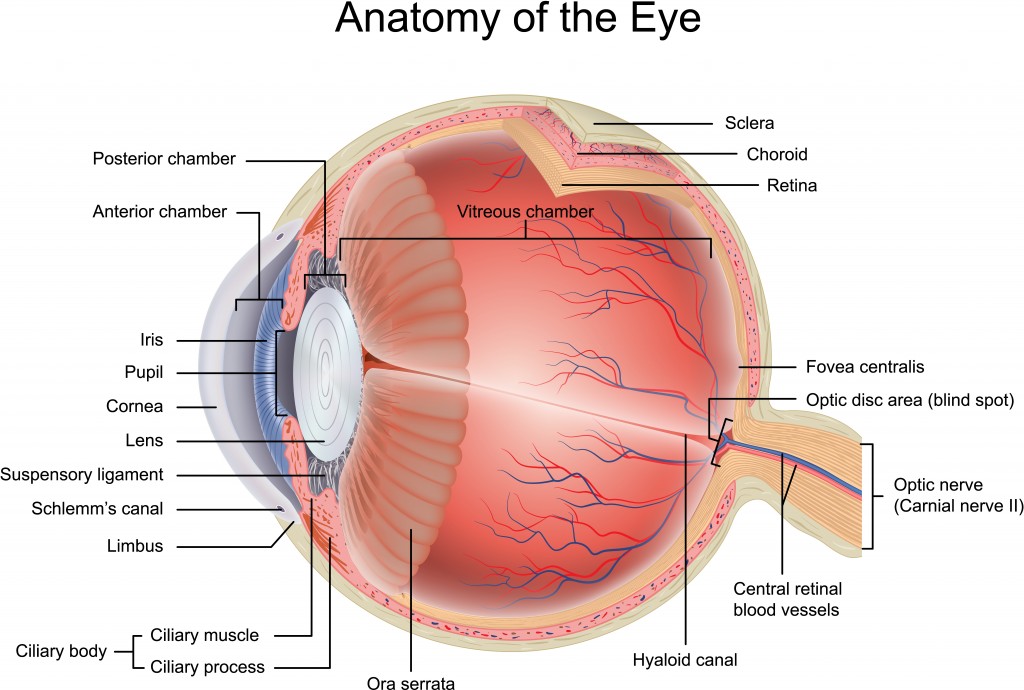New research reveals most Britons unaware of damage to their eyes by surrounding objects, activities, and devices.
The poll has shown that many British people remain uninformed about the various ways in which eyes are damaged by common daily factors, despite evidence that eye health is affected by blue light[i], UV rays (reflected from common surfaces)[ii], diet[iii], obesity[iv], and smoking[v].
Of the 2,096 people polled, the percentage of respondents aware of the link between known factors affecting and eye health were:
- Poor diet (59%)
- Obesity (35%)
- Smoking tobacco (36%)
- UV light, not just direct from the sun but reflected off shiny surfaces (54%)
- Blue light from low energy lightbulbs and electronic screens (29%)
Over one in ten people were completely unaware that any of these factors could affect your eyesight at all.
72% of respondents own or wear prescription glasses but only 28% knew that there were lenses available (for both prescription and non-prescription glasses) to protect against some of these factors. Namely ‘blue light’ (emitted from electronic devices and low energy light bulbs), and ‘UV light’ (not only directly from the sun but also from reflections such as off of water, windows, and road surfaces).
76% admitted they haven’t heard of E-SPF ratings – the grade given to lenses to show the level of protection they offer against UV.
Just 13% have lenses with protection from direct and reflected UV light, and only 2% have protection from blue light (from screens, devices, and low energy bulbs).
Poll results showed that younger people were most aware of the dangers of UV and blue light, yet least aware of how smoking tobacco and obesity can affect your eye health. W
Awareness of the impacts of smoking and obesity on eye health is significantly higher in Scotland (47% & 49% respectively) than anywhere else in the UK (35% & 33% in England and 40% & 38% in Wales).
Essilor’s Professional Relations Manager, Andy Hepworth, has commented: “The lack of awareness about these common risks to people’s eyes is concerning. Not only would many more glasses wearers be better protected, but also many people who do not wear glasses would likely take precautions too, if made aware of the dangers and the existence of non-prescription protective lenses”
To see the full results of the poll, please visit the Essilor site here: http://www.essilor.co.uk/all_about_vision/all_about_vision_news_events/Eye_Health_At_Risk
For more information on the protection offered from blue light and UV through specialist lens coatings, for both prescriptions and non-prescription glasses, please see here for Essilor UV & Blue Light Protection.
*All figures, unless otherwise stated, are from YouGov Plc. Total sample size was 2,096 adults. Fieldwork was undertaken between 21st and 24th August 2015. The survey was carried out online. The figures have been weighted and are representative of all GB adults (aged 18+).
[i] Blue light causes a chemical to be produced that brings on cell death in the eye. Over time this can lead to age related muscular degeneration (AMD). – Aging of Cultured Retinal Pigment Epithelial Cells: Oxidative Reactions, Lipofuscin Formation and Blue Light Damage – Documenta Ophthalmologica. http://link.springer.com/article/10.1023/A:1022419606629
[ii] Prolonged exposure to UV rays can bring about early-onset cataracts and premature ocular aging. – Effect of Ultraviolet Radiation on Cataract Formation – The New England Journal of Medicine. http://www.nejm.org/doi/pdf/10.1056/NEJM198812013192201
Reflected UV rays are arguably more important than direct rays, as they are responsible for 50% of the UV radiation we receive, yet it is not as immediately obvious to the public that this is a concern. – Meyler J and Schnider C. The role of UV-blocking soft CLs in ocular protection. Optician 2002, 223: 5854: 28-32.
[iii] A good diet rich in carotenoids from foods such as broccoli, green beans, leafy greens, foods with vitamins C and E, foods with omega-3 fatty acids and foods with zinc can help prevent macular degeneration. – Dietary Antioxidants and the Long-term Incidence of Age-Related Macular Degeneration: The Blue Mountains Eye Study – Ophthalmology. http://www.sciencedirect.com/science/article/pii/S0161642007004745 and Dietary Carotenoids, Vitamins A, C, and E, and Advanced Age-Related Macular Degeneration – The Journal of the American Medical Association. http://jama.jamanetwork.com/article.aspx?articleid=382145
[iv] Obesity puts pressure on to blood vessels, which are especially delicate in your eyes, and this causes damage that can lead to poor vision. Obesity is also related to poor nutrition, which can prevent your eyes from getting the vitamins they need to maintain good health. – Obesity, Lutein Metabolism, and Age-Related Macular Degeneration: a Web of Connections – Nutrition Reviews – Oxford Journals. http://nutritionreviews.oxfordjournals.org/content/63/1/9
[1] Blue light causes a chemical to be produced that brings on cell death in the eye. Over time this can lead to age related muscular degeneration (AMD). – Aging of Cultured Retinal Pigment Epithelial Cells: Oxidative Reactions, Lipofuscin Formation and Blue Light Damage – Documenta Ophthalmologica. http://link.springer.com/article/10.1023/A:1022419606629
[1] Prolonged exposure to UV rays can bring about early-onset cataracts and premature ocular aging. – Effect of Ultraviolet Radiation on Cataract Formation – The New England Journal of Medicine. http://www.nejm.org/doi/pdf/10.1056/NEJM198812013192201
Reflected UV rays are arguably more important than direct rays, as they are responsible for 50% of the UV radiation we receive, yet it is not as immediately obvious to the public that this is a concern. – Meyler J and Schnider C. The role of UV-blocking soft CLs in ocular protection. Optician 2002, 223: 5854: 28-32.
[1] A good diet rich in carotenoids from foods such as broccoli, green beans, leafy greens, foods with vitamins C and E, foods with omega-3 fatty acids and foods with zinc can help prevent macular degeneration. – Dietary Antioxidants and the Long-term Incidence of Age-Related Macular Degeneration: The Blue Mountains Eye Study – Ophthalmology. http://www.sciencedirect.com/science/article/pii/S0161642007004745 and Dietary Carotenoids, Vitamins A, C, and E, and Advanced Age-Related Macular Degeneration – The Journal of the American Medical Association. http://jama.jamanetwork.com/article.aspx?articleid=382145
[1] Obesity puts pressure on to blood vessels, which are especially delicate in your eyes, and this causes damage that can lead to poor vision. Obesity is also related to poor nutrition, which can prevent your eyes from getting the vitamins they need to maintain good health. – Obesity, Lutein Metabolism, and Age-Related Macular Degeneration: a Web of Connections – Nutrition Reviews – Oxford Journals. http://nutritionreviews.oxfordjournals.org/content/63/1/9
[1] Smoking amplifies the impact of oxidation on cells in the eye, as well as restricting blood flow and causing build-up of heavy metals in the eye. – Smoking And Neovascular Form Of Age Related Macular Degeneration In Late Middle Aged Males: Findings From A Case-Control Study In Japan – British Journal of Ophthalmology. http://bjo.bmj.com/content/81/10/901.full
[v] Smoking amplifies the impact of oxidation on cells in the eye, as well as restricting blood flow and causing build-up of heavy metals in the eye. – Smoking And Neovascular Form Of Age Related Macular Degeneration In Late Middle Aged Males: Findings From A Case-Control Study In Japan – British Journal of Ophthalmology. http://bjo.bmj.com/content/81/10/901.full




